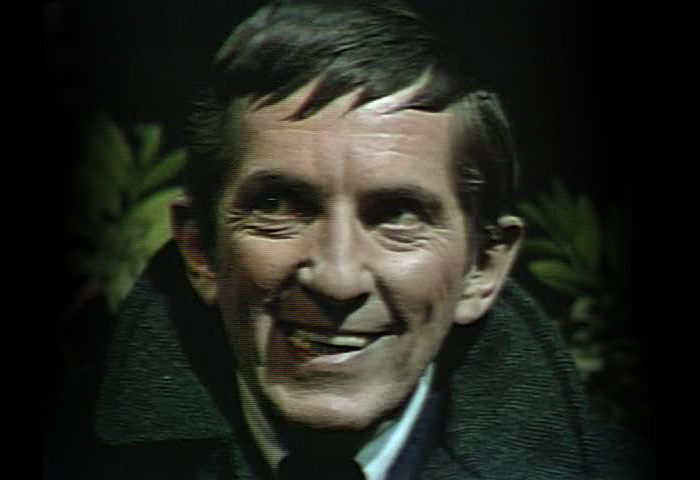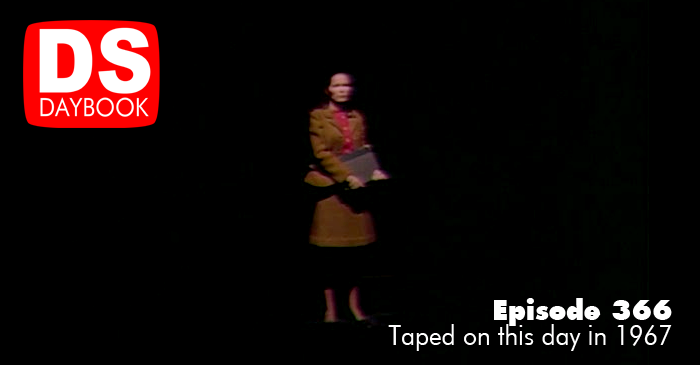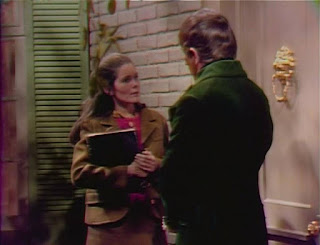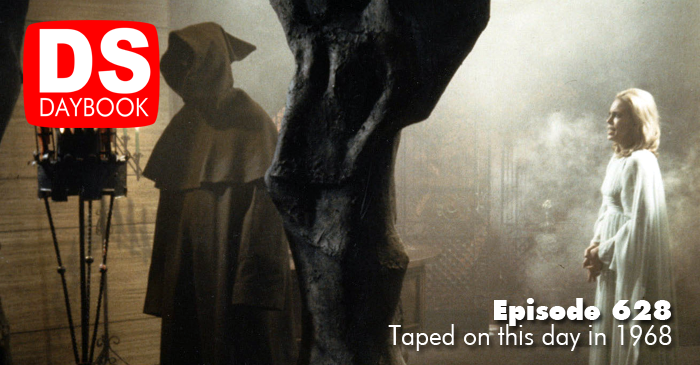By PATRICK McCRAY
Taped on this date in 1968: Episode 633/634
When Nicholas presents Maggie as his Satanic spouse and life force candidate, can Barnabas defeat him before his master race becomes a reality? Barnabas: Jonathan Frid. (Repeat; 30 min.)
Nicholas conducts a black rite that bonds Maggie to him. He takes her to become the life force for Eve. Barnabas, who is already horrified, is made even more so by Maggie’s lovestruck loyalty to Nicholas. As the experiment begins, Maggie’s pain becomes unbearable to watch. Knowing that this is his only chance to end Nicholas once and for all, Barnabas smashes the electrical equipment, killing Eve at last and sending a terrified and powerless Nicholas running. Barnabas gives pursuit with every intent to kill him, but Diabolos claims Nicholas first, as Barnabas laughs at the spectacle. Meanwhile, Maggie revives with Julia, but seems to be in a haze that is connected to her time as a prisoner in the Old House. Will she remember at last? Adam escapes and charges into Collinwood, furious that his mate is no more.
This is one of my all-time favorite Dark Shadows episodes because of how much progress it shows. Not only does the plot leap with true irreversibility, but the characters change irreversibly as well. Barnabas has two great moments of moral awakening on the show. One is at the beginning of the Adam storyline, while this one is at the end, in this episode. The arc begins when Barnabas is left alone with Jeff Clark, who is about to be mutilated to soften Adam’s appearance. He frees him, although he knows it will probably squash his chances with Vicki. His moral compass is recognized for the first time since Angelique began her campaign. Yes, he continues to help evil enterprises, but a bit like Julia at that point, it is under duress or to serve a larger end. It is in this episode that this stops. He has already selected to choose good over evil, personally. But here, he goes beyond selecting good actions for himself to preventing evil being visited upon others. All told, this is a helluva journey to go on in what, for Barnabas, is about a year (not counting suspended animation) or less from when Angelique cursed him.
The cast is having a disciplined blast in this one, and the writers give them plenty of TNT. Humbert Allen Astredo must have been well loved. His last episode begins with a satanic wedding ceremony and ends with him being consumed by hellfire. In between, he induces coronaries, gloats, wins, loses, and finds that his powers have been sapped. He does almost everything an actor can do in a four hour play yet pulls it off in 23 minutes. Meanwhile, Kathryn Leigh Scott plays both an icy, occult loyalist and a spell-struck Josette as the whammy leaves her. She looks like she’s having a ball as well, and she works in two kinds of menace. Her Kool-Aid drunken loyalty to Nicholas motivates Barnabas by making him equally jealous and mortified.
The man of the hour, however, is Jonathan Frid. Barnabas has spent months in hesitant apprehension. He wrung his hands so much, I’m amazed he graduated from the show with any fingerprints left. However, here he gets to indulge in inner conflict that turns into passionate action. Months of a story finally explodes into seconds of resolution, and Frid seems more refreshed and energetic than he has in months.
The production is wrapping up sweeps and approaching final exams and Christmas break, making it a perfect time to introduce a more family-oriented story (with Amy and Chris) and lay the grounds for the next big thing… Quentin Collins.
This episode was broadcast Nov. 27, 1968.







